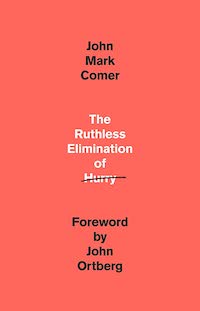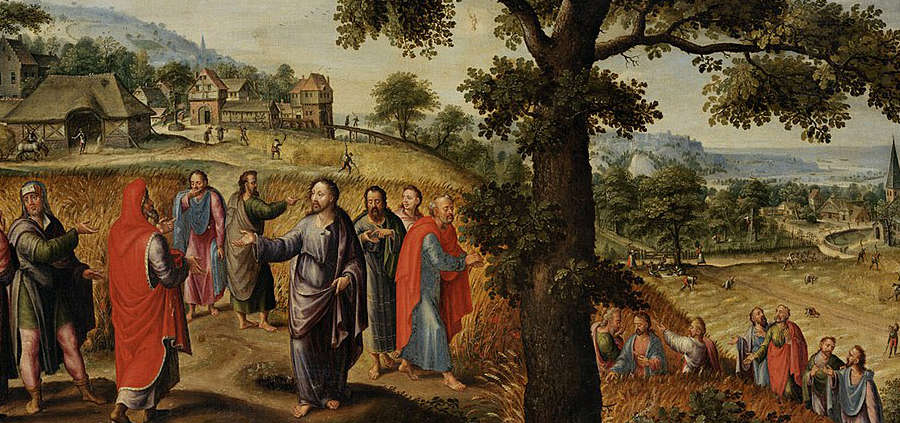Slow Christianity by Megan Ulrich
Note to readers: Be sure to check out Megan’s reflection on small Christian communities, “Carrying Each Other’s Burdens,” also available today on our Mikroi page—Ed.
John Mark Comer’s The Ruthless Elimination of Hurry (2019) is a re-examination of the life of Jesus, not through the sometimes inexorable lens of tradition, but with the fresh eyes of someone who profoundly loves Jesus—or “rabbi,” as Comer calls him—and truly wants to follow his ways.
Comer positions his book as a dismantling of hurry. And though his ideas seem radical at first, he’s the first to admit that living a simple and disciplined life centered on communion with God isn’t really a “new” idea. He reintroduces Western Christians to a first-century itinerant rabbi with an “easy yoke” and a rule of life completely at odds with the busyness of the 21st century. He challenges Christians to truly look at Jesus’s life as a template for how to live our own. Comer calls out something that should be fairly obvious, but is largely forgotten in modern Christianity: Jesus, the son of God and redeemer of all mankind, was never in a rush. He moved slowly. He regularly practiced silence and solitude. He wasn’t hustling, certainly not for followers and not even for God. Which begs the question, if the savior of the world didn’t lead a hurried life, why do we? And more importantly, how can we stop?
 Comer more than answers these questions, not just with his own thoughts on the simple life, but by gently prodding our hearts to listen to Jesus’s words with fresh ears. To accomplish this, the book is broken into three parts. The first articulates the problem of hurry and why it’s so detrimental to our souls. The second explores the solution to our hurried modern lives: actually taking on the “easy yoke” of Jesus and following his rule of life. In the third and final part, Comer offers four practices for “unhurrying your life”: silence and solitude, sabbath, simplicity, and slowing.
Comer more than answers these questions, not just with his own thoughts on the simple life, but by gently prodding our hearts to listen to Jesus’s words with fresh ears. To accomplish this, the book is broken into three parts. The first articulates the problem of hurry and why it’s so detrimental to our souls. The second explores the solution to our hurried modern lives: actually taking on the “easy yoke” of Jesus and following his rule of life. In the third and final part, Comer offers four practices for “unhurrying your life”: silence and solitude, sabbath, simplicity, and slowing.
Comer’s first section offers a convincing argument against the busyness of the modern world. He quotes Dallas Willard, philosopher and Christian writer, who says that “Hurry is the great enemy of spiritual life in our day.” It is a quote that Comer initially struggles with, thinking surely that the “enemy of spiritual life” must be something more insidious like “modernity or postmodernity or liberal theology or the popularization of the prosperity gospel” or countless other attacks on our souls. Eventually, though, he recognizes how damaging hurry actually is, writing that “hurry and love are incompatible,” a strong claim when combined with the truth that God is love itself. Here, he offers quotes from everyone from philosophers and poets to Catholic priests and noted psychologists to help make his point. But, perhaps most convincingly, he reflects on the moments in his own life when he is so busy that he is no longer gentle with those he loves, when he no longer mirrors the love of God.
The second part of the book offers that the solution to this problem of constant busyness is to follow Jesus and take on his yoke (i.e., “teachings on how to be human”). Comer argues that, to apprentice under Jesus, you need to spend time with Jesus, become like him, and then do what he would do if he was living in your shoes. Jesus is the most joyful man to have ever lived. And yet modern Christians are looking to self-help gurus and book-toting psychologists to give us a “rule of life” when we already have the best path there ever has been, and ever will be, to live a joyful existence in communion with God. It’s revelations like these that make Comer’s book so worthwhile. He has a talent for revealing the truth in such a way that seems obvious, almost like you’d already known it but were never able to put words to it before.
Comer’s third and final section gets into the nuts and bolts of how to actually follow Jesus’s path. He gives four suggestions—silence and solitude, sabbath, simplicity, and slowing—to put us on the path of Jesus. All four are worthwhile, but the one that challenged me the most is sabbath. Like many other millennials, I’ve fallen into the hype surrounding minimalism. I don’t need much convincing to constantly winnow down pretty much everything I own. Simplicity has become more culturally common, but sabbath, who actually practices sabbath? Comer, and Jesus, charge Christians to rest on sabbath, challenging almost every aspect of our worldly identity. Practicing sabbath reminds us of our identity as beloved children, but if that isn’t already your primary identity, resting in it can be difficult. It’s a day to put your phone away, put the to-do list away, and only do the things that combine both rest and worship. Now, Comer leaves room for people to discern what that means on an individual basis, but for the most part, it means sitting with Jesus and the body of Christ present in those we love. It means resting with him. And it’s difficult, more difficult than I want to admit. All of the other disciplines Comer introduces have an equally transformative power, not just over the events of the day, but in one’s relationship with God and everyone else that one loves.
Overall, Comer is succinct and humorous. His writing is authentic and raw, but not in a way that feels like oversharing. He opens the door so we can see ourselves in him and hopefully walk away changed. He offers a convincing argument for eliminating hurry and is kind enough to give us a template for how to reclaim the meekness of Jesus in the 21st century.
Comer is a former megachurch pastor who now resides in the urban core of Portland, Oregon, serving the most religiously unaffiliated city in the U.S. through Bridgetown Church. He lives there with his wife and three children. He’s written other books, including his most recent publication, Live No Lies (2021), which discusses three major lies that influence Christians in the industrialized West. Comer is obviously not Catholic. I’ve found that many Catholics write off Protestant speakers simply because of their background instead of accepting that Jesus has the power to communicate through everyone, even a megachurch pastor with skinny jeans and a large social media following. That being said, I think Catholics have something to learn from this man.
The Catholic Church offers a rich history of tradition, one I revere. It’s one of the reasons I’m Catholic, but it’s also not the main reason I’m a follower of Jesus. As beautiful and necessary as tradition is, it’s dangerous when it becomes an idol, tempting us to give our time and devotion to anything other than God. For this reason, it’s no surprise that a Protestant wrote a book that re-examines spiritual disciplines, not through two thousand years of tradition, but simply through the lens of the gospel. And just in case you think Comer is tradition-averse, he does seem to have an affinity for order, but one that is realized through (not instead of) his relationship with Jesus. He lands on a spiritual discipline that feels deeply ingrained in the life of Jesus and in keeping with the tradition of many saints: a simple life that is oriented toward the Father’s love for us.
Comer is seeking the truth of Jesus, and his book challenges everyone, Protestants and Catholics alike, to sit at Jesus’s feet, to listen to his words and then to walk with him. Like Comer and many others who sit at the feet of the living God, we will find ourselves abiding with a man who tenderly speaks into our hearts: “I am gentle and lowly in heart, and you will find rest for your souls. For my yoke is easy, and my burden is light.” And then we get to decide: Do we want to walk with him to heaven? ♦
Megan Ulrich lives with her husband and three sons in a charming little town in East Tennessee. She enjoys biking her son to school, coffee with friends, and convincing her husband to donate everything they own. Check out her website to sign-up for her monthly poetry newsletter.





Leave a Reply
Want to join the discussion?Feel free to contribute!